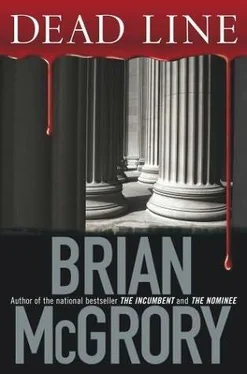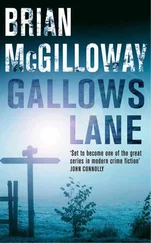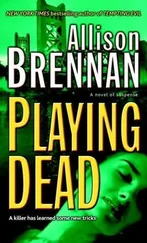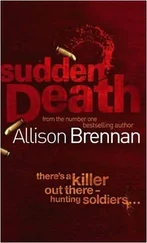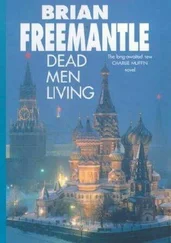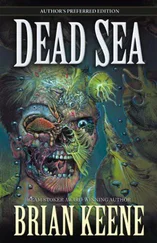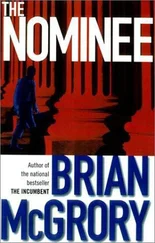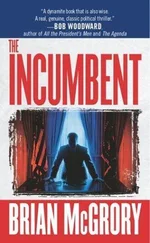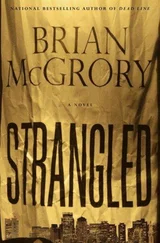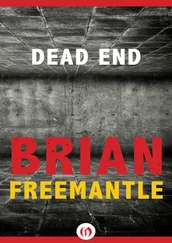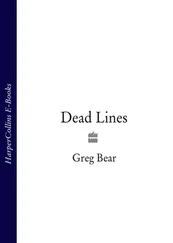Brian Mcgrory - Dead Line
Здесь есть возможность читать онлайн «Brian Mcgrory - Dead Line» весь текст электронной книги совершенно бесплатно (целиком полную версию без сокращений). В некоторых случаях можно слушать аудио, скачать через торрент в формате fb2 и присутствует краткое содержание. ISBN: , Жанр: Политический детектив, на английском языке. Описание произведения, (предисловие) а так же отзывы посетителей доступны на портале библиотеки ЛибКат.
- Название:Dead Line
- Автор:
- Жанр:
- Год:неизвестен
- ISBN:0-7434-8034-1
- Рейтинг книги:3 / 5. Голосов: 1
-
Избранное:Добавить в избранное
- Отзывы:
-
Ваша оценка:
- 60
- 1
- 2
- 3
- 4
- 5
Dead Line: краткое содержание, описание и аннотация
Предлагаем к чтению аннотацию, описание, краткое содержание или предисловие (зависит от того, что написал сам автор книги «Dead Line»). Если вы не нашли необходимую информацию о книге — напишите в комментариях, мы постараемся отыскать её.
Dead Line — читать онлайн бесплатно полную книгу (весь текст) целиком
Ниже представлен текст книги, разбитый по страницам. Система сохранения места последней прочитанной страницы, позволяет с удобством читать онлайн бесплатно книгу «Dead Line», без необходимости каждый раз заново искать на чём Вы остановились. Поставьте закладку, и сможете в любой момент перейти на страницу, на которой закончили чтение.
Интервал:
Закладка:
I snatched up my phone and called Martin’s office. He picked up on the first ring.
“Who do we have on the Boston Common murder?”
“For right now, Mongillo. He’s the only staffer up this early.”
We both hung up, comfortable enough with each other that we didn’t need time-consuming salutations or felicitations. I immediately belted out Mongillo’s cell phone number, and he, too, picked up on the first ring.
“Mongillo.”
“Flynn here.”
His voice brightened. “Hey, hey, it’s Fair Hair”—his nickname for me. “This is an unexpected honor. Hold on while I get rid of this call.” That’s the thing about Vinny Mongillo — he always had another call. About five seconds later, he was back on the line.
“So why on God’s good earth would Jack Flynn, the author of the biggest story in America today, be calling a simple little reporting grunt like me?”
This, for anyone who knows Mongillo, even in passing, was an obvious dose of false modesty. He was as tenacious a reporter as I’ve ever met. He wielded his ever-present phone like a mallet and his pen like a jackhammer, and he had this inordinate, almost otherworldly ability to convince a coat of paint to share the secrets of the damned. This he knew, and so did virtually everyone who knew him.
“Why,” I replied with a question of my own, as newspaper people tend to do, “would the FBI be interested in that murder you’re covering?”
“I didn’t know they were.”
“I believe there’s at least one agent on the scene, and maybe others that I don’t know about.”
He paused, then asked, “Why do you think they’d be interested?”
He’s uncanny. He heard in my voice the whispery combination of faint knowledge and uncertainty, and was calling me on it.
I replied, “Why don’t we get together.”
“I’ll call you after the police briefing.”
He was about to hang up when I asked, “The victim, Vinny. What’s her name?”
“Hilary Kane,” he said, without hesitation. And then the line went dead, without so much as a good-bye.
Chapter Six
I was driving up and down Mount Vernon Street in the most historic — read: priciest — neighborhood of Boston, trying not to call attention to myself, which was no easy feat, considering my aging Alfa Romeo convertible was sending up plumes of black smoke from the decrepit exhaust. All parts of my life seemed to be breaking down.
It was, as I earlier mentioned, a gorgeous autumn day, temperate, with a gentle sun giving the entire city a clean glow — all of it, every bit, in direct contrast to my gloomy mood. Dog walkers in ponytails led bunches of Labradors and poodles up and down the steep hill. A few of the patrician elderly carried sacks of groceries from DeLuca’s Market or Savenor’s butcher shop. And in front of the apartment building in question, a three-story brick town house that butted up against the narrow sidewalk, a blue-and-white police van sat double-parked. This is where Hilary Kane lived until earlier this morning, and police were inside searching for clues.
I turned to my passenger, one Hank Sweeney, retired Boston homicide detective, now a shockingly pricey corporate security consultant, and asked, “How the hell much longer will they be in there?”
“Any moment,” he replied. He said this distractedly, fidgeting, as he was, with a new Palm Pilot V he was trying to program. Actually, check that. I’m not sure if he was trying to program it, or just figure out how to turn it on.
“You use one of these things?” he asked me, his voice still uncharacteristically soft, like his mind was somewhere else.
“I’ve got a leather-bound datebook that does the trick.”
“Does it have an On switch?”
“You just open the cover and flip to the page you need.”
He said, “Yeah, that’s probably the way to go.” And he tossed his Palm Pilot down onto the carpeted floor.
Again, I drove by the apartment, and still, the van sat in the street. The outside apartment doors were closed. There was nothing to see but the clock ticking away toward my deadline.
Truth be known, I’m not sure what I was after. I had a pretty significant story unfolding on my watch, by my hand — new clues in the Gardner art heist — and here I was chasing my gut up and down Beacon Hill, waiting for a couple of numbskull cops to pack up their gear and hightail it back to headquarters with a few boxes of who knows what.
But something nagged. Actually, no, it didn’t nag; it fairly well screamed. Something about that story last night wasn’t quite right. Something about this murder this morning wasn’t quite as it seemed. The feeling was causing a minor wave of nausea through my innards.
About an hour earlier, I had taken the simple step of looking up Hilary Kane in a legal directory. It said she graduated from Boston University Law School the year before and worked in a small firm in Cambridge. When I called the firm, the line had been disconnected. I called the BU Law School alumni office, and a curt woman there told me there was no record of where anyone by the name of Hilary Kane was currently employed. A police department spokeswoman told me, off the record, that they found a Massachusetts Bar card in her purse, but nothing that indicated where she now worked. This was just another reason why the police were inside her house at the time.
Which is why I was waiting to get in there as well. I needed to know if my suspicions bled into reality, if Hilary Kane was somehow connected to the art heist.
Hank, meanwhile, needed to know how to program numbers into his new cell phone, which he had pulled from his pocket and was regarding as if it were part of an elaborate communications experiment conducted by a team of professors at MIT. At a stop sign, I took the phone and punched my own name and phone number into his memory, and then punched his name and number into mine.
“It’s like we’re sweethearts,” he said with that wry smile of his. And he tossed the phone down on the floor next to his Palm Pilot.
I drove up and down, again and again, Hank making almost unimaginably banal small talk, and me playing over the events of my life in my mind. A huge story breaks. Elizabeth and I are incapable of discussing her impending move. I inexplicably feel involved in the murder of a woman I don’t even know.
And then the apartment doors opened. I quickly pulled into a rare Beacon Hill parking space to watch. A man and a woman, each wearing golf shirts, khaki pants, and sneakers, came walking out, each one of them balancing a sizable box in their arms. Their matching dress and rigid, humorless demeanor told me they were either tourists from the Dakotas or cops from Boston. Their shoulder holsters and shields hooked to their respective belt loops confirmed the latter. The fact that they had the Boston police insignia emblazoned on their jerseys actually screamed it. You don’t need Bob Woodward here in Boston when the city is already blessed with Jack Flynn.
“Here we go,” I said to Sweeney, who was squinting out the windshield at them. “Looks like they’re cleaning her out.”
“Routine, very routine,” he replied, his voice low, flat, as if the detectives might be able to hear us.
They set the boxes down on the street, and, as the woman began placing the items in the back of the van, the man went back inside the apartment foyer and retrieved a computer monitor. He made one more trip back inside, and came out with what looked like the computer itself. They slammed the back doors, settled inside, and started the engine, the woman driving, the man shotgun. Justice for Hilary Kane was very much in the hands of the state.
Except, wait a minute. A shiny, gunmetal-black sedan came pounding up Mount Vernon Street, swerved around the van, and shot in front of it, screeching to a stop at a jagged angle that prevented the police vehicle from continuing in any direction but into the parked cars. A second car, identical in appearance, came racing up the hill seconds behind it and snuggled up close to the back of the van. Almost in unison, the driver’s and passenger doors flung open on each of the cars, and four men in dark suits jumped onto the pavement and scurried to each side of the blue van.
Читать дальшеИнтервал:
Закладка:
Похожие книги на «Dead Line»
Представляем Вашему вниманию похожие книги на «Dead Line» списком для выбора. Мы отобрали схожую по названию и смыслу литературу в надежде предоставить читателям больше вариантов отыскать новые, интересные, ещё непрочитанные произведения.
Обсуждение, отзывы о книге «Dead Line» и просто собственные мнения читателей. Оставьте ваши комментарии, напишите, что Вы думаете о произведении, его смысле или главных героях. Укажите что конкретно понравилось, а что нет, и почему Вы так считаете.
